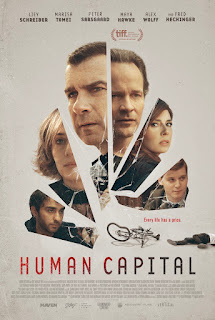They All Did It: "Human Capital" a compellingly acted mixed bag of threads with little meaning
Human Capital (2020)
97 min.
Release Date: March 20, 2020 (VOD)
Based on the book by Stephen Amidon and the 2015 Italian film, “Human Capital” is one of those interconnected ensemble melodramas, told from three different vantage points, that reminds in certain ways of 2005’s “Crash,” 2013’s “Disconnect,” and the like. Instead of race relations and communication in the electronic age, this morality play is more about the choices we make around a monumental event with socioeconomic disparity as a backdrop, and it’s less thought-provoking. While not every perspective has the same interest level, nor do they all add up to a meaningful whole, director Marc Meyers (2017’s “My Friend Dahmer”) and writer Oren Moverman (2018’s “Puzzle”) make sure the more involving pieces get more observation and are equipped with uniformly compelling performances.
“Human Capital” opens with a New York banquet server working a high school fundraiser/award ceremony, leaving his shift on his bike, and then being struck by a jeep racing around a bend. The identity of the driver serves as the film’s mystery, while the family man on the side of the road is never to be heard from again. Rather, the focus is on two families of different financial standing who end up being affected by the aforementioned tragedy. Real estate agent Drew (Liev Schreiber) and his second wife, Ronnie (Betty Gabriel), are expecting twins just as Drew puts his and her livelihood at stake. This happens after dropping off Shannon (Maya Hawke), his daughter from his first marriage, at the mansion of her boyfriend and meets the parents, wealthy businessman Quint (Peter Sarsgaard) and bored, unhappy Carrie (Maria Tomei). Still struggling with a gambling addiction, Drew is easily swayed to invest in Quint’s hedge fund, fudging the numbers when taking a loan out on his house. Meanwhile, with time on her hands, Carrie decides she wants to restore a dilapidated theater as a culture center but needs Quint to bankroll her project. And then, Shannon ends up falling hard for disreputable classmate Ian (Alex Wolff). Where is all of this going?
It must be the point that “Human Capital” spends all of its time in subplots with everyone and their comparatively small problems, rendering the victim of a hit and run (and his loved ones) insignificant. Where these point-of-view threads converge after overlapping each other, though, is of the take-it-or-leave-it variety. The getting-there is where the strong roster of acting talent comes in to make a scene urgent or affecting, even if not all of them are allotted enough room to breathe life into parts that are totemic rather than flesh-and-blood. While Peter Sarsgaard gets little else to play than well-off arrogance and Liev Schreiber struggles to keep the desperate Drew interesting, a few others are served the more engaging chapters. Maria Tomei is poignant as Carrie, a trophy wife ready to be self-made; breakout up-and-comer Maya Hawke (Netflix’s “Stranger Things”), daughter of Ethan Hawke and Uma Thurman, brings a natural spark to Shannon; and Alex Wolff (2018’s “Hereditary”) has a craven vulnerability under his rebellious exterior as Ian. If the payoff doesn’t heat up as one might be expecting, “Human Capital” is sturdy enough as a drama but also pretty self-important if it thinks it’s saying anything deeply profound.
Grade: C +











Comments
Post a Comment